University Career Development Report: Assessment 1 and 2 Analysis
VerifiedAdded on 2021/09/16
|8
|1720
|53
Report
AI Summary
This report, focusing on career development, explores various theories such as career construction, value-based decision-making, strengths-based approaches, and chaos career theory. It defines career development standards and their impact on services, highlighting legislative and regulatory requirements. The report emphasizes the importance of understanding target groups for effective career support. Additionally, it examines career development services for customer service officers, including the application of theories, the need for professional codes of conduct, and action planning skills. It also addresses strategies for record storage, professional development needs, and improving career development services through employee performance assessment and benchmarking. The report provides a comprehensive overview of career planning and professional development.
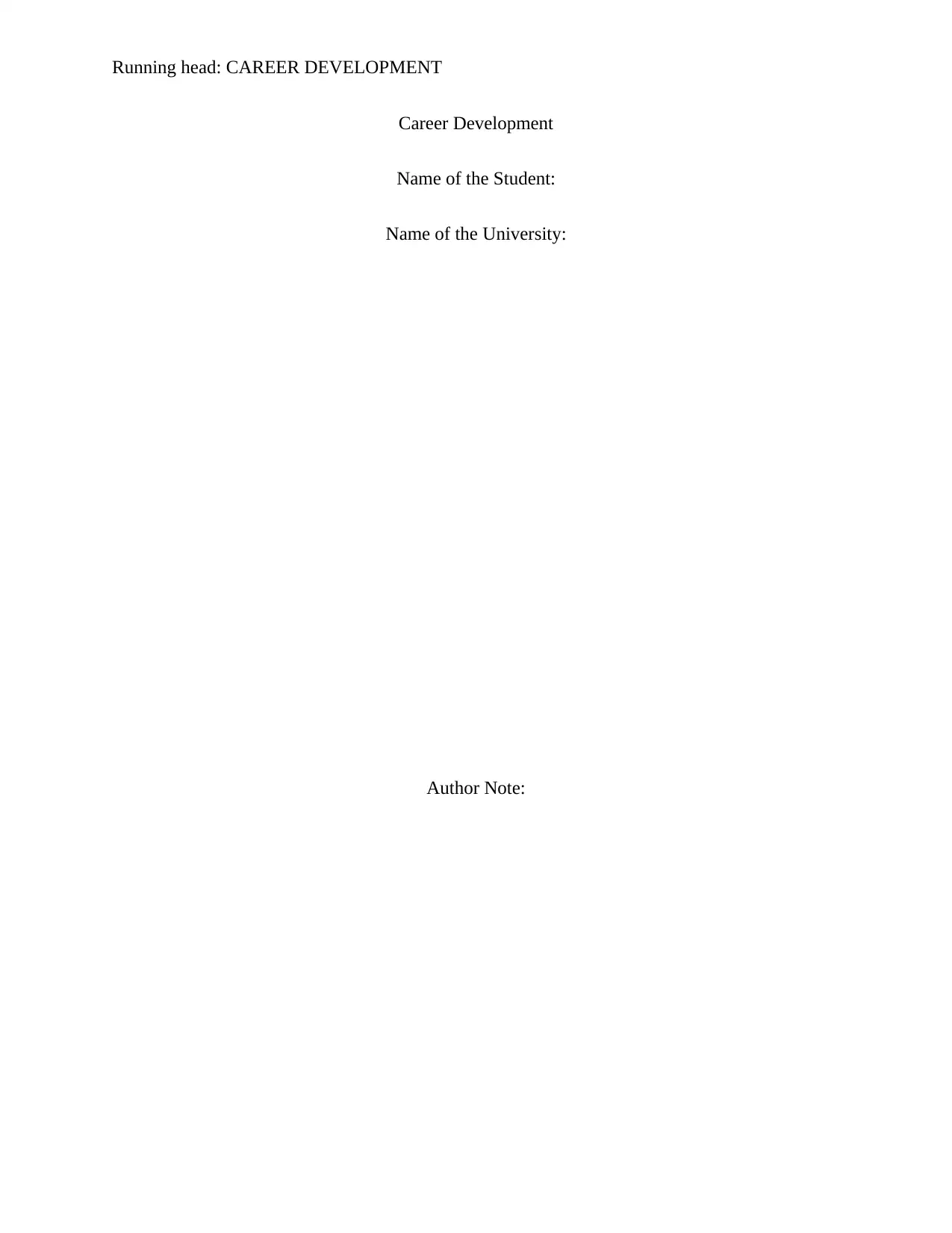
Running head: CAREER DEVELOPMENT
Career Development
Name of the Student:
Name of the University:
Author Note:
Career Development
Name of the Student:
Name of the University:
Author Note:
Paraphrase This Document
Need a fresh take? Get an instant paraphrase of this document with our AI Paraphraser
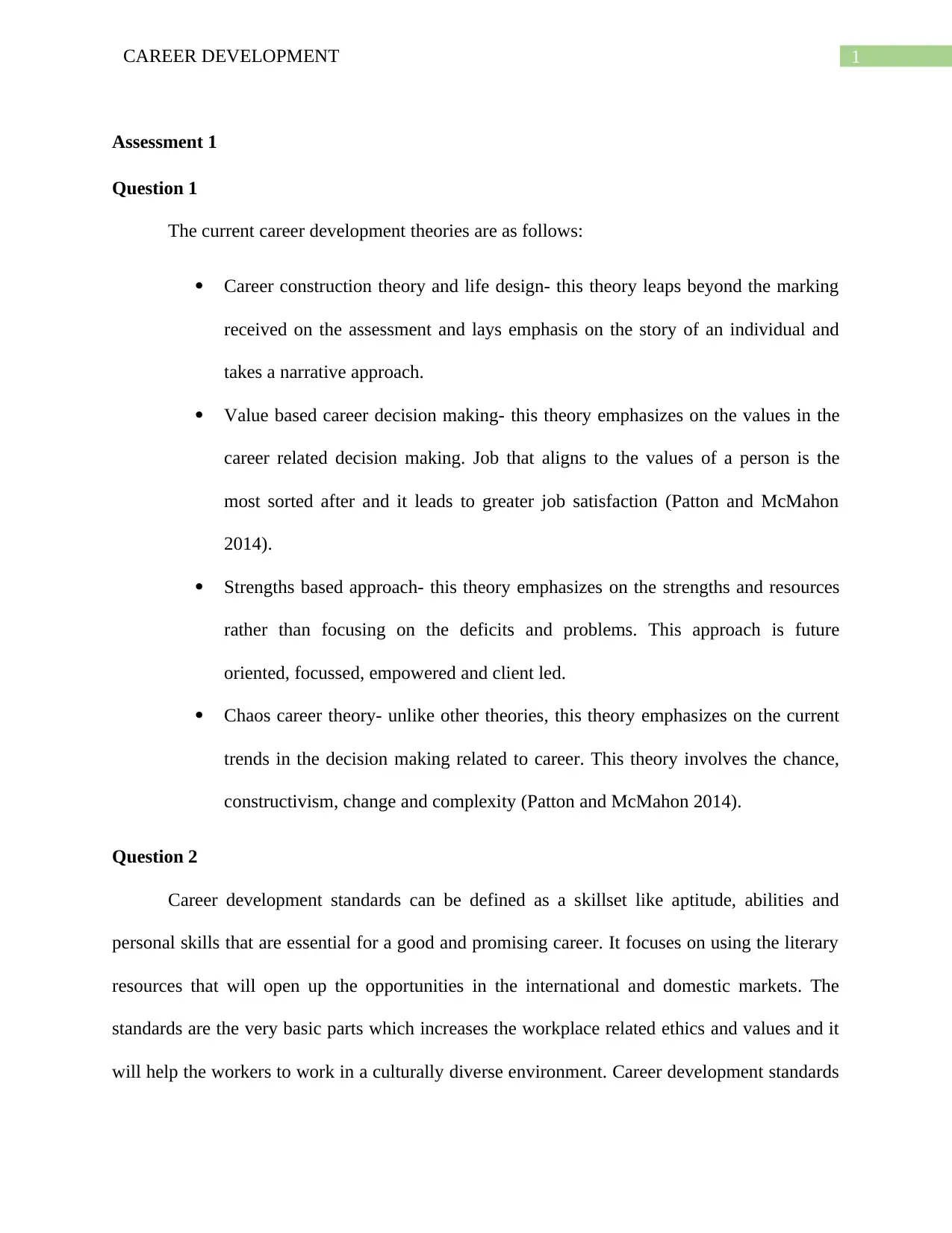
1CAREER DEVELOPMENT
Assessment 1
Question 1
The current career development theories are as follows:
Career construction theory and life design- this theory leaps beyond the marking
received on the assessment and lays emphasis on the story of an individual and
takes a narrative approach.
Value based career decision making- this theory emphasizes on the values in the
career related decision making. Job that aligns to the values of a person is the
most sorted after and it leads to greater job satisfaction (Patton and McMahon
2014).
Strengths based approach- this theory emphasizes on the strengths and resources
rather than focusing on the deficits and problems. This approach is future
oriented, focussed, empowered and client led.
Chaos career theory- unlike other theories, this theory emphasizes on the current
trends in the decision making related to career. This theory involves the chance,
constructivism, change and complexity (Patton and McMahon 2014).
Question 2
Career development standards can be defined as a skillset like aptitude, abilities and
personal skills that are essential for a good and promising career. It focuses on using the literary
resources that will open up the opportunities in the international and domestic markets. The
standards are the very basic parts which increases the workplace related ethics and values and it
will help the workers to work in a culturally diverse environment. Career development standards
Assessment 1
Question 1
The current career development theories are as follows:
Career construction theory and life design- this theory leaps beyond the marking
received on the assessment and lays emphasis on the story of an individual and
takes a narrative approach.
Value based career decision making- this theory emphasizes on the values in the
career related decision making. Job that aligns to the values of a person is the
most sorted after and it leads to greater job satisfaction (Patton and McMahon
2014).
Strengths based approach- this theory emphasizes on the strengths and resources
rather than focusing on the deficits and problems. This approach is future
oriented, focussed, empowered and client led.
Chaos career theory- unlike other theories, this theory emphasizes on the current
trends in the decision making related to career. This theory involves the chance,
constructivism, change and complexity (Patton and McMahon 2014).
Question 2
Career development standards can be defined as a skillset like aptitude, abilities and
personal skills that are essential for a good and promising career. It focuses on using the literary
resources that will open up the opportunities in the international and domestic markets. The
standards are the very basic parts which increases the workplace related ethics and values and it
will help the workers to work in a culturally diverse environment. Career development standards
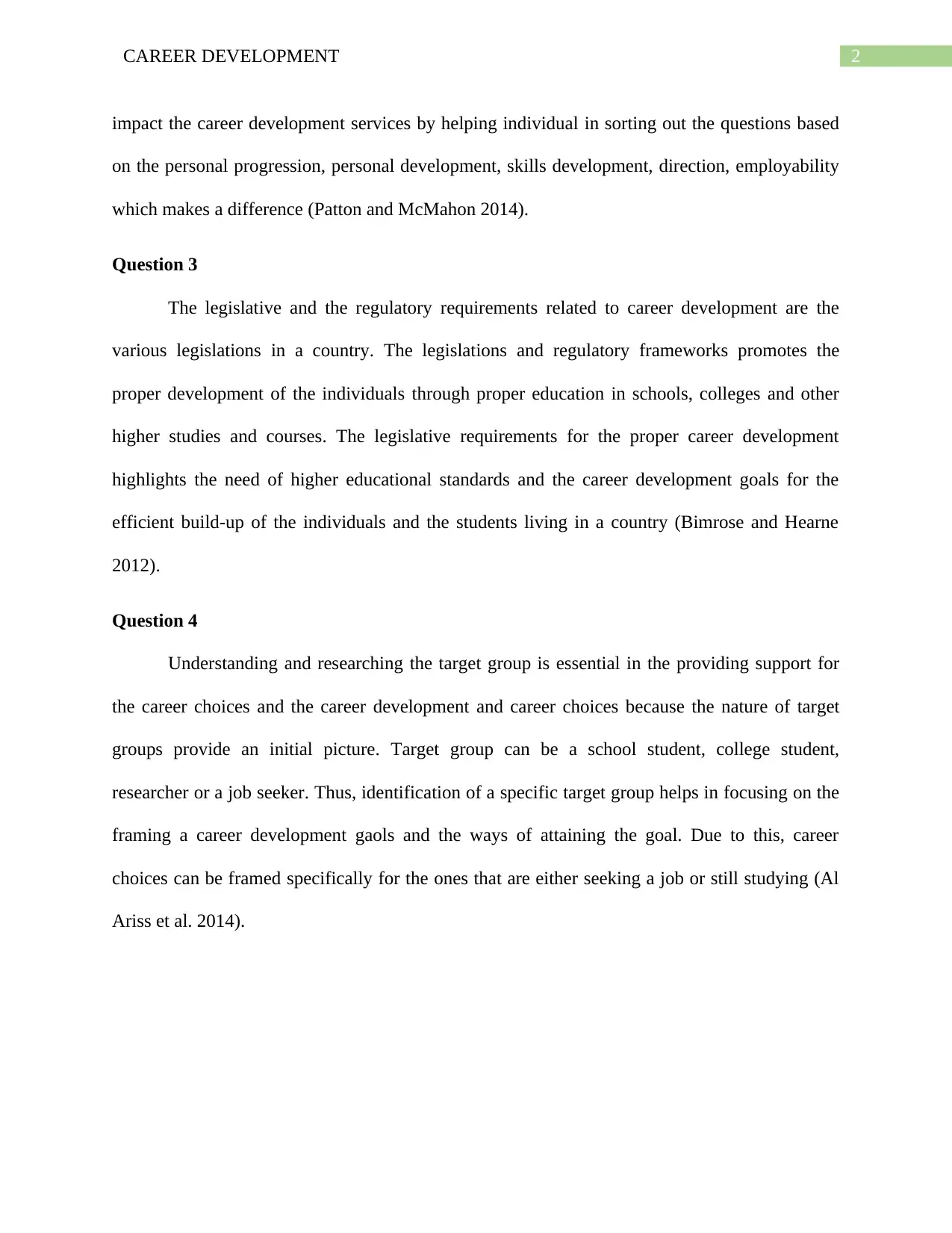
2CAREER DEVELOPMENT
impact the career development services by helping individual in sorting out the questions based
on the personal progression, personal development, skills development, direction, employability
which makes a difference (Patton and McMahon 2014).
Question 3
The legislative and the regulatory requirements related to career development are the
various legislations in a country. The legislations and regulatory frameworks promotes the
proper development of the individuals through proper education in schools, colleges and other
higher studies and courses. The legislative requirements for the proper career development
highlights the need of higher educational standards and the career development goals for the
efficient build-up of the individuals and the students living in a country (Bimrose and Hearne
2012).
Question 4
Understanding and researching the target group is essential in the providing support for
the career choices and the career development and career choices because the nature of target
groups provide an initial picture. Target group can be a school student, college student,
researcher or a job seeker. Thus, identification of a specific target group helps in focusing on the
framing a career development gaols and the ways of attaining the goal. Due to this, career
choices can be framed specifically for the ones that are either seeking a job or still studying (Al
Ariss et al. 2014).
impact the career development services by helping individual in sorting out the questions based
on the personal progression, personal development, skills development, direction, employability
which makes a difference (Patton and McMahon 2014).
Question 3
The legislative and the regulatory requirements related to career development are the
various legislations in a country. The legislations and regulatory frameworks promotes the
proper development of the individuals through proper education in schools, colleges and other
higher studies and courses. The legislative requirements for the proper career development
highlights the need of higher educational standards and the career development goals for the
efficient build-up of the individuals and the students living in a country (Bimrose and Hearne
2012).
Question 4
Understanding and researching the target group is essential in the providing support for
the career choices and the career development and career choices because the nature of target
groups provide an initial picture. Target group can be a school student, college student,
researcher or a job seeker. Thus, identification of a specific target group helps in focusing on the
framing a career development gaols and the ways of attaining the goal. Due to this, career
choices can be framed specifically for the ones that are either seeking a job or still studying (Al
Ariss et al. 2014).
⊘ This is a preview!⊘
Do you want full access?
Subscribe today to unlock all pages.

Trusted by 1+ million students worldwide
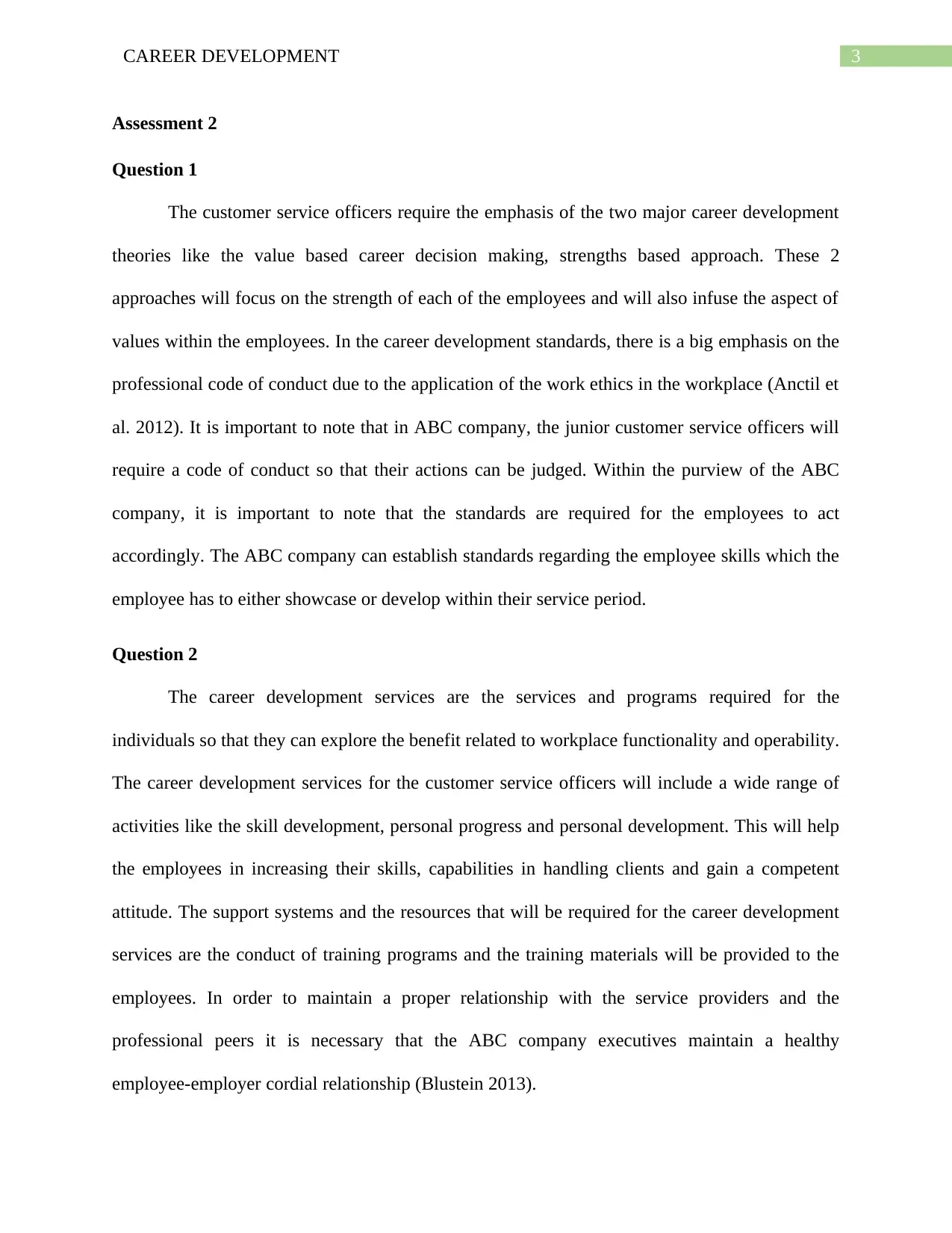
3CAREER DEVELOPMENT
Assessment 2
Question 1
The customer service officers require the emphasis of the two major career development
theories like the value based career decision making, strengths based approach. These 2
approaches will focus on the strength of each of the employees and will also infuse the aspect of
values within the employees. In the career development standards, there is a big emphasis on the
professional code of conduct due to the application of the work ethics in the workplace (Anctil et
al. 2012). It is important to note that in ABC company, the junior customer service officers will
require a code of conduct so that their actions can be judged. Within the purview of the ABC
company, it is important to note that the standards are required for the employees to act
accordingly. The ABC company can establish standards regarding the employee skills which the
employee has to either showcase or develop within their service period.
Question 2
The career development services are the services and programs required for the
individuals so that they can explore the benefit related to workplace functionality and operability.
The career development services for the customer service officers will include a wide range of
activities like the skill development, personal progress and personal development. This will help
the employees in increasing their skills, capabilities in handling clients and gain a competent
attitude. The support systems and the resources that will be required for the career development
services are the conduct of training programs and the training materials will be provided to the
employees. In order to maintain a proper relationship with the service providers and the
professional peers it is necessary that the ABC company executives maintain a healthy
employee-employer cordial relationship (Blustein 2013).
Assessment 2
Question 1
The customer service officers require the emphasis of the two major career development
theories like the value based career decision making, strengths based approach. These 2
approaches will focus on the strength of each of the employees and will also infuse the aspect of
values within the employees. In the career development standards, there is a big emphasis on the
professional code of conduct due to the application of the work ethics in the workplace (Anctil et
al. 2012). It is important to note that in ABC company, the junior customer service officers will
require a code of conduct so that their actions can be judged. Within the purview of the ABC
company, it is important to note that the standards are required for the employees to act
accordingly. The ABC company can establish standards regarding the employee skills which the
employee has to either showcase or develop within their service period.
Question 2
The career development services are the services and programs required for the
individuals so that they can explore the benefit related to workplace functionality and operability.
The career development services for the customer service officers will include a wide range of
activities like the skill development, personal progress and personal development. This will help
the employees in increasing their skills, capabilities in handling clients and gain a competent
attitude. The support systems and the resources that will be required for the career development
services are the conduct of training programs and the training materials will be provided to the
employees. In order to maintain a proper relationship with the service providers and the
professional peers it is necessary that the ABC company executives maintain a healthy
employee-employer cordial relationship (Blustein 2013).
Paraphrase This Document
Need a fresh take? Get an instant paraphrase of this document with our AI Paraphraser
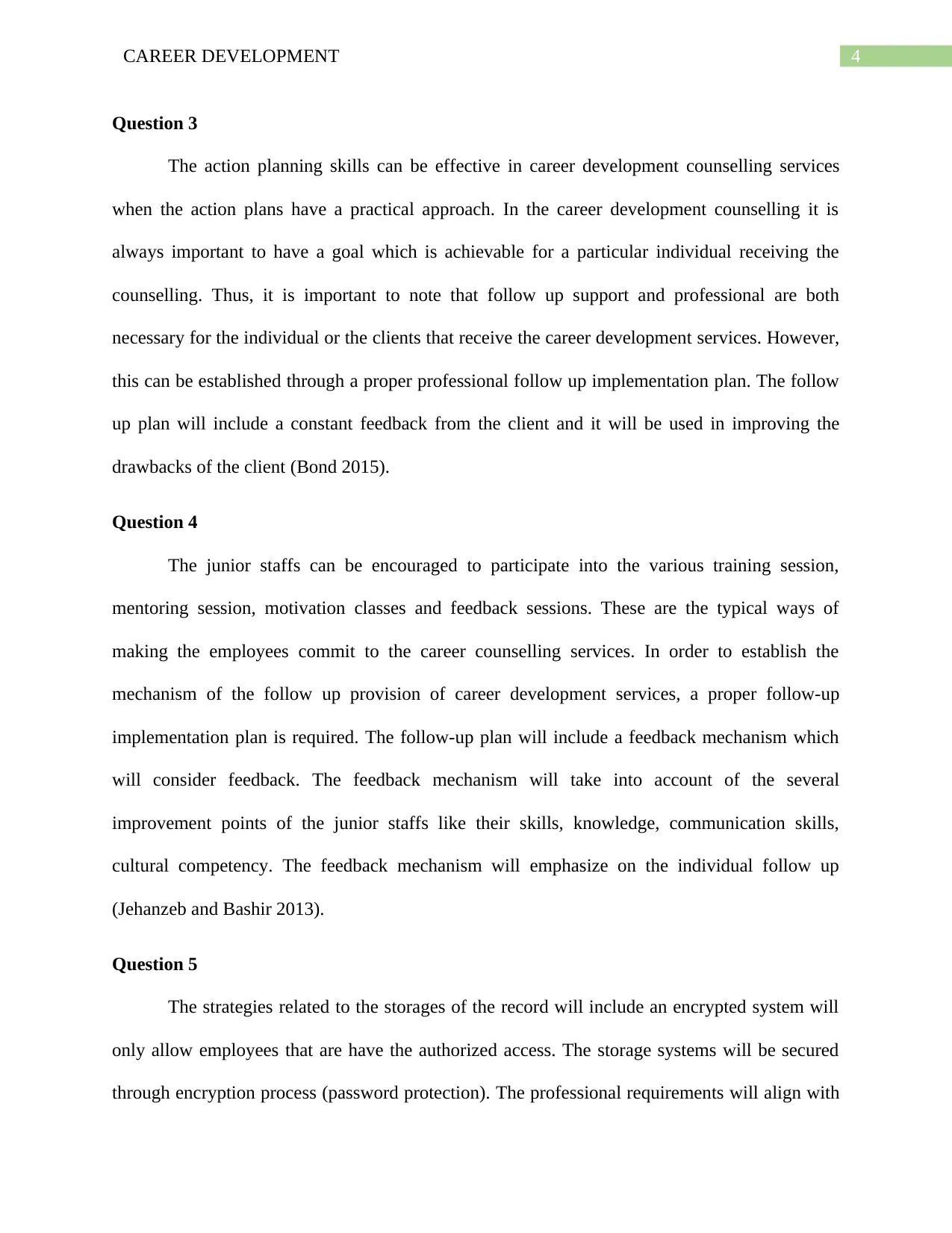
4CAREER DEVELOPMENT
Question 3
The action planning skills can be effective in career development counselling services
when the action plans have a practical approach. In the career development counselling it is
always important to have a goal which is achievable for a particular individual receiving the
counselling. Thus, it is important to note that follow up support and professional are both
necessary for the individual or the clients that receive the career development services. However,
this can be established through a proper professional follow up implementation plan. The follow
up plan will include a constant feedback from the client and it will be used in improving the
drawbacks of the client (Bond 2015).
Question 4
The junior staffs can be encouraged to participate into the various training session,
mentoring session, motivation classes and feedback sessions. These are the typical ways of
making the employees commit to the career counselling services. In order to establish the
mechanism of the follow up provision of career development services, a proper follow-up
implementation plan is required. The follow-up plan will include a feedback mechanism which
will consider feedback. The feedback mechanism will take into account of the several
improvement points of the junior staffs like their skills, knowledge, communication skills,
cultural competency. The feedback mechanism will emphasize on the individual follow up
(Jehanzeb and Bashir 2013).
Question 5
The strategies related to the storages of the record will include an encrypted system will
only allow employees that are have the authorized access. The storage systems will be secured
through encryption process (password protection). The professional requirements will align with
Question 3
The action planning skills can be effective in career development counselling services
when the action plans have a practical approach. In the career development counselling it is
always important to have a goal which is achievable for a particular individual receiving the
counselling. Thus, it is important to note that follow up support and professional are both
necessary for the individual or the clients that receive the career development services. However,
this can be established through a proper professional follow up implementation plan. The follow
up plan will include a constant feedback from the client and it will be used in improving the
drawbacks of the client (Bond 2015).
Question 4
The junior staffs can be encouraged to participate into the various training session,
mentoring session, motivation classes and feedback sessions. These are the typical ways of
making the employees commit to the career counselling services. In order to establish the
mechanism of the follow up provision of career development services, a proper follow-up
implementation plan is required. The follow-up plan will include a feedback mechanism which
will consider feedback. The feedback mechanism will take into account of the several
improvement points of the junior staffs like their skills, knowledge, communication skills,
cultural competency. The feedback mechanism will emphasize on the individual follow up
(Jehanzeb and Bashir 2013).
Question 5
The strategies related to the storages of the record will include an encrypted system will
only allow employees that are have the authorized access. The storage systems will be secured
through encryption process (password protection). The professional requirements will align with
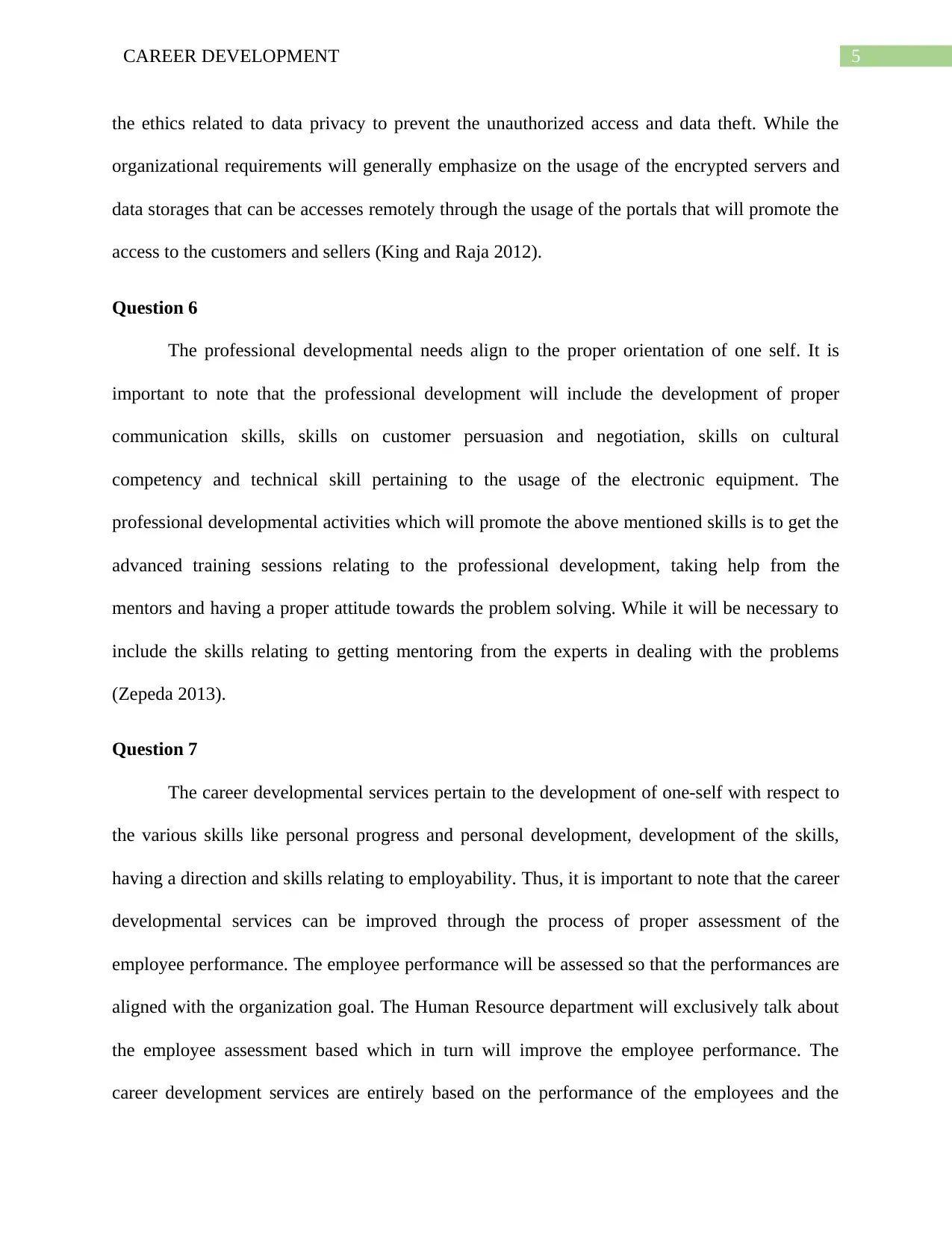
5CAREER DEVELOPMENT
the ethics related to data privacy to prevent the unauthorized access and data theft. While the
organizational requirements will generally emphasize on the usage of the encrypted servers and
data storages that can be accesses remotely through the usage of the portals that will promote the
access to the customers and sellers (King and Raja 2012).
Question 6
The professional developmental needs align to the proper orientation of one self. It is
important to note that the professional development will include the development of proper
communication skills, skills on customer persuasion and negotiation, skills on cultural
competency and technical skill pertaining to the usage of the electronic equipment. The
professional developmental activities which will promote the above mentioned skills is to get the
advanced training sessions relating to the professional development, taking help from the
mentors and having a proper attitude towards the problem solving. While it will be necessary to
include the skills relating to getting mentoring from the experts in dealing with the problems
(Zepeda 2013).
Question 7
The career developmental services pertain to the development of one-self with respect to
the various skills like personal progress and personal development, development of the skills,
having a direction and skills relating to employability. Thus, it is important to note that the career
developmental services can be improved through the process of proper assessment of the
employee performance. The employee performance will be assessed so that the performances are
aligned with the organization goal. The Human Resource department will exclusively talk about
the employee assessment based which in turn will improve the employee performance. The
career development services are entirely based on the performance of the employees and the
the ethics related to data privacy to prevent the unauthorized access and data theft. While the
organizational requirements will generally emphasize on the usage of the encrypted servers and
data storages that can be accesses remotely through the usage of the portals that will promote the
access to the customers and sellers (King and Raja 2012).
Question 6
The professional developmental needs align to the proper orientation of one self. It is
important to note that the professional development will include the development of proper
communication skills, skills on customer persuasion and negotiation, skills on cultural
competency and technical skill pertaining to the usage of the electronic equipment. The
professional developmental activities which will promote the above mentioned skills is to get the
advanced training sessions relating to the professional development, taking help from the
mentors and having a proper attitude towards the problem solving. While it will be necessary to
include the skills relating to getting mentoring from the experts in dealing with the problems
(Zepeda 2013).
Question 7
The career developmental services pertain to the development of one-self with respect to
the various skills like personal progress and personal development, development of the skills,
having a direction and skills relating to employability. Thus, it is important to note that the career
developmental services can be improved through the process of proper assessment of the
employee performance. The employee performance will be assessed so that the performances are
aligned with the organization goal. The Human Resource department will exclusively talk about
the employee assessment based which in turn will improve the employee performance. The
career development services are entirely based on the performance of the employees and the
⊘ This is a preview!⊘
Do you want full access?
Subscribe today to unlock all pages.

Trusted by 1+ million students worldwide
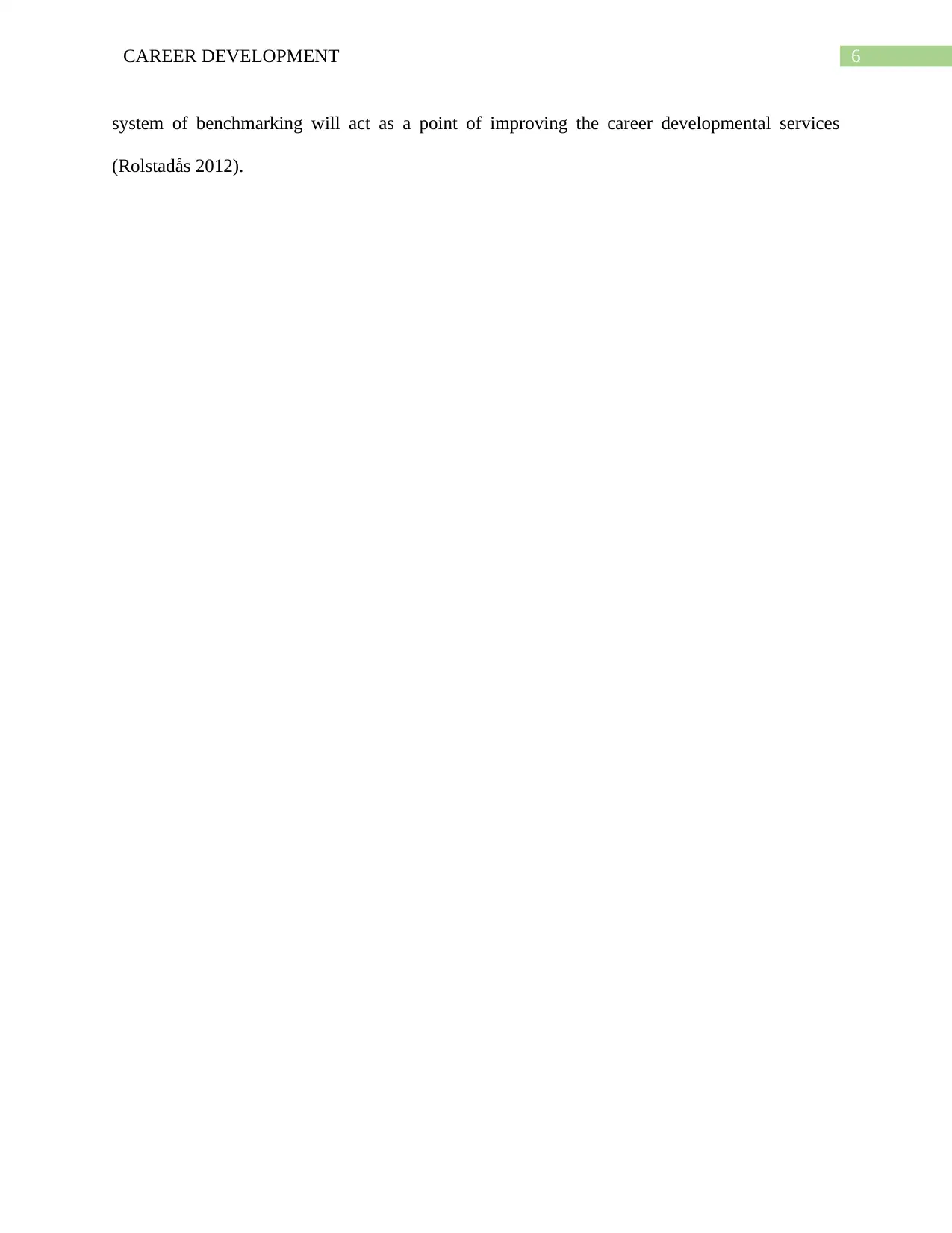
6CAREER DEVELOPMENT
system of benchmarking will act as a point of improving the career developmental services
(Rolstadås 2012).
system of benchmarking will act as a point of improving the career developmental services
(Rolstadås 2012).
Paraphrase This Document
Need a fresh take? Get an instant paraphrase of this document with our AI Paraphraser
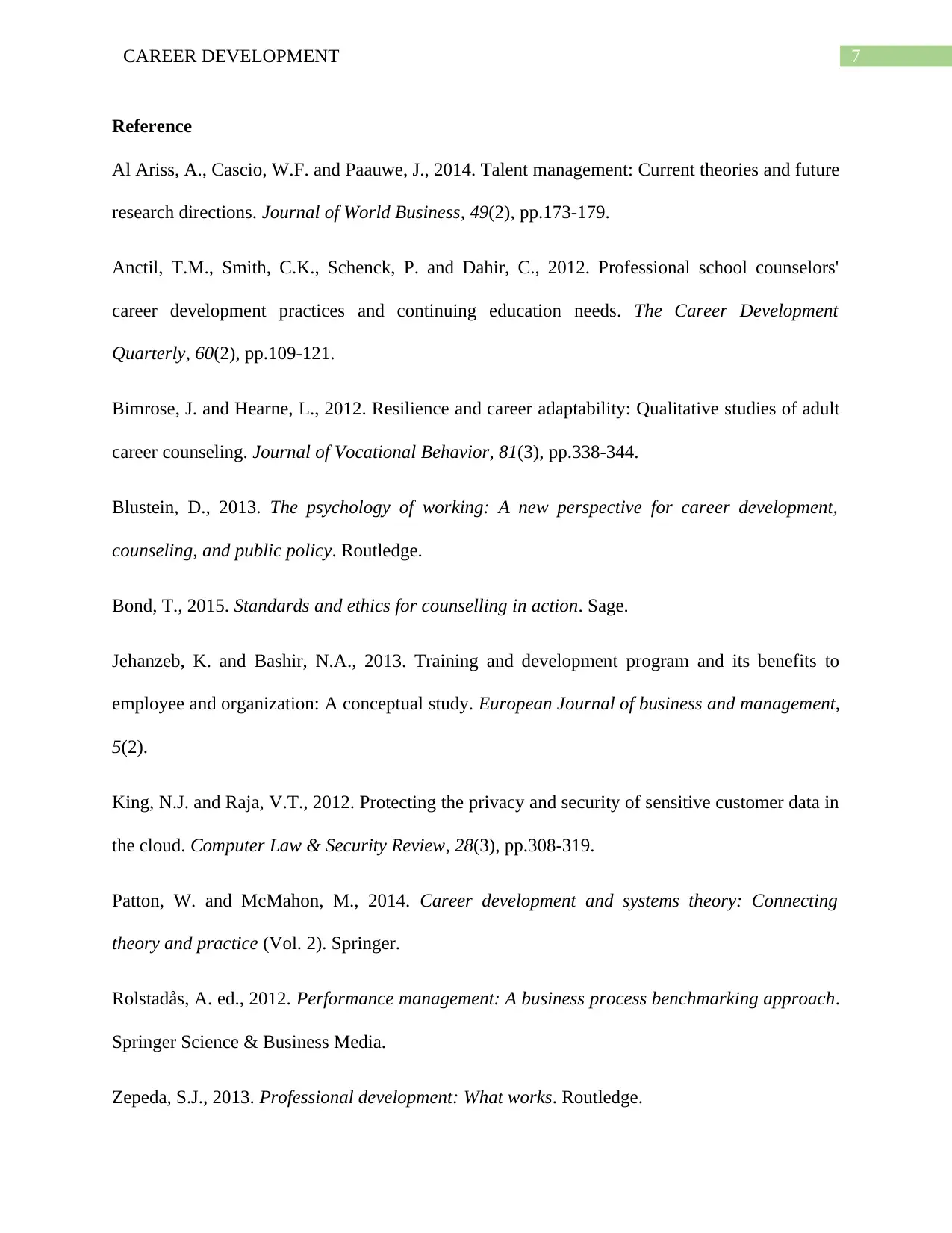
7CAREER DEVELOPMENT
Reference
Al Ariss, A., Cascio, W.F. and Paauwe, J., 2014. Talent management: Current theories and future
research directions. Journal of World Business, 49(2), pp.173-179.
Anctil, T.M., Smith, C.K., Schenck, P. and Dahir, C., 2012. Professional school counselors'
career development practices and continuing education needs. The Career Development
Quarterly, 60(2), pp.109-121.
Bimrose, J. and Hearne, L., 2012. Resilience and career adaptability: Qualitative studies of adult
career counseling. Journal of Vocational Behavior, 81(3), pp.338-344.
Blustein, D., 2013. The psychology of working: A new perspective for career development,
counseling, and public policy. Routledge.
Bond, T., 2015. Standards and ethics for counselling in action. Sage.
Jehanzeb, K. and Bashir, N.A., 2013. Training and development program and its benefits to
employee and organization: A conceptual study. European Journal of business and management,
5(2).
King, N.J. and Raja, V.T., 2012. Protecting the privacy and security of sensitive customer data in
the cloud. Computer Law & Security Review, 28(3), pp.308-319.
Patton, W. and McMahon, M., 2014. Career development and systems theory: Connecting
theory and practice (Vol. 2). Springer.
Rolstadås, A. ed., 2012. Performance management: A business process benchmarking approach.
Springer Science & Business Media.
Zepeda, S.J., 2013. Professional development: What works. Routledge.
Reference
Al Ariss, A., Cascio, W.F. and Paauwe, J., 2014. Talent management: Current theories and future
research directions. Journal of World Business, 49(2), pp.173-179.
Anctil, T.M., Smith, C.K., Schenck, P. and Dahir, C., 2012. Professional school counselors'
career development practices and continuing education needs. The Career Development
Quarterly, 60(2), pp.109-121.
Bimrose, J. and Hearne, L., 2012. Resilience and career adaptability: Qualitative studies of adult
career counseling. Journal of Vocational Behavior, 81(3), pp.338-344.
Blustein, D., 2013. The psychology of working: A new perspective for career development,
counseling, and public policy. Routledge.
Bond, T., 2015. Standards and ethics for counselling in action. Sage.
Jehanzeb, K. and Bashir, N.A., 2013. Training and development program and its benefits to
employee and organization: A conceptual study. European Journal of business and management,
5(2).
King, N.J. and Raja, V.T., 2012. Protecting the privacy and security of sensitive customer data in
the cloud. Computer Law & Security Review, 28(3), pp.308-319.
Patton, W. and McMahon, M., 2014. Career development and systems theory: Connecting
theory and practice (Vol. 2). Springer.
Rolstadås, A. ed., 2012. Performance management: A business process benchmarking approach.
Springer Science & Business Media.
Zepeda, S.J., 2013. Professional development: What works. Routledge.
1 out of 8
Related Documents
Your All-in-One AI-Powered Toolkit for Academic Success.
+13062052269
info@desklib.com
Available 24*7 on WhatsApp / Email
![[object Object]](/_next/static/media/star-bottom.7253800d.svg)
Unlock your academic potential
Copyright © 2020–2026 A2Z Services. All Rights Reserved. Developed and managed by ZUCOL.





